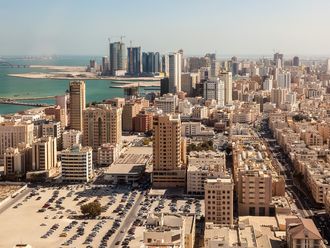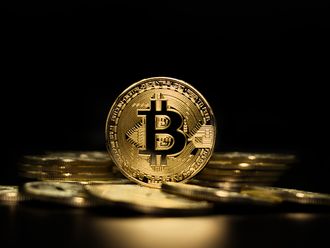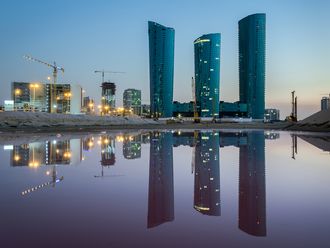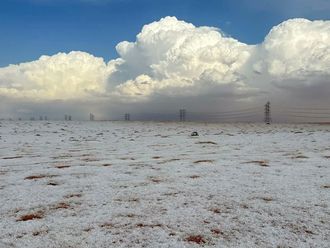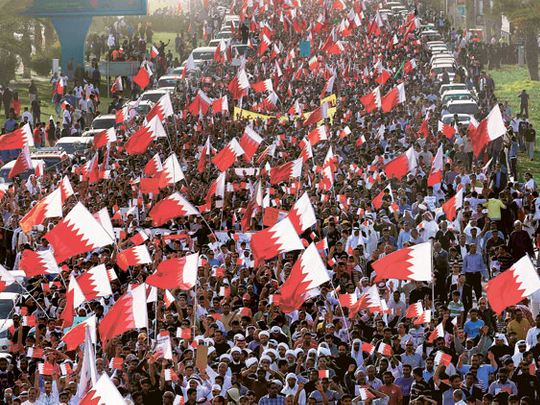
Manama: The Hall for Royal Occasions in Zallaq Palace is aptly named. Hugh Waterford crystal chandeliers hang from the ceiling, and the room is large enough to park a jumbo jet, and there's enough red carpet to keep every VIP happy.
Outside, security is tighter than a camel's eye in a sandstorm, with armed soldiers and policemen everywhere. Blue Tahoes with tinted windows are parked beside motorbike policemen in ceremonial whites.
King Hamad Bin Eisa Al Khalifa sat centre stage, as he listened to the report of the Bahrain Independent Commission of Inquiry with Crown Prince, Prince Salman Bin Hamad Al Khalifa to his left, and the Prime Minister, Prince Khalifa Bin Salman Al Khalifa to his right.
The Hall for Royal Occasions was full of dignitaries from every walk of Bahraini life, diplomatic representatives, government officials and police and military senior officers.
You can tell about body language by watching how people sit, how they squirm, how they move.
When Mahmoud Sharif Bassiouni began to address the Hall for Royal Occasions, shoulders went down, lips were pursed, heads were nodded or shook.
Polarised society
The Egyptian-American chairman of the Independent Commission of Inquiry took a few moments to get into his stride, and by singling out the dialogue began under the Crown Prince in February as an opportunity lost, it looked for a moment as if the whole three-month process that talked to 9,000 people, would be to exonerate the government. But Bassiouni was surprisingly blunt. His investigation into the violence that rocked Bahrain between February and March, and which have polarised its society to the present day, was far reaching, brutally honest, and left no pebble, never mind stone, unturned.
Detainees were "tortured", their human rights were "violated" by police and military, he said.
For 25 minutes, Bassiouni listed "abuses", people "wrong fired", suspended from university, subjected to arbitrary arrest. Moreover, he found no outside influence from Iran.
Democratic interaction
He recommended compensation for the wrongs done during the violence which killed 30 protesters and five policemen, according to his report.
And the King sat and listened to every word, not missing as much as a comma. It was he who called for the independent commission to be set up in the first place.
Any management guru worth his salt will tell you that leadership is about learning from the mistakes, and making sure they never happen again.
King Hamad said that in European nations, criticism is part of democratic interaction. He cited how the European Court of Justice and Human Rights regularly criticises member states, and governments there do not flinch from the criticism, but take it and build on it for the betterment of all. And he went further, much further. How about an Arab Court of Human Rights to report on the abuses of governments inflicted on their citizens across the Arab world. You could almost hear the cellphones ringing in Damascus and Sana'a on that one. And he hinted that Bahrain might be a good place for it to sit.
Iran propaganda
But he said that while the commission found no evidence that Iran was directly involved, all Bahrainis had heard the propaganda aired from across the Arabian Gulf.
He pledged to take the report's conclusions on board. Those who were responsible for the human rights violations would be punished. You know it's a good report when both sides were unhappy, and the Twittershpere was equally divided.
Having seen the sad chapter in Bahrain's history unfold first hand in February and March, I think Bassiouni got it right.
This was a good day in the Hall for Royal Occasions. It was a good day for all Bahrainis, Sunni or Shiite, supporters or opponents of the government. It was a good day for human rights, freedom of the press, reining in police powers. And it's a good day for all Arabs.
Given the events of this Arab Spring, how many other states would have the strength of character to call for criticism, then take it on the chin?


